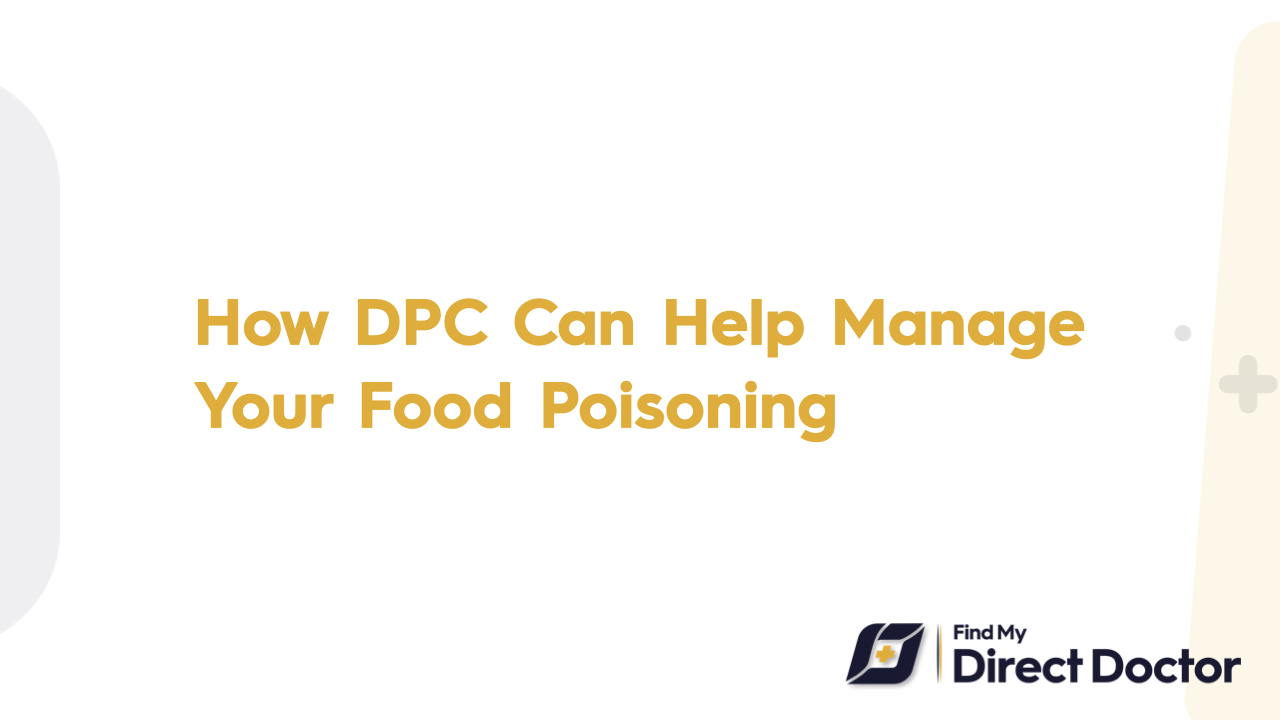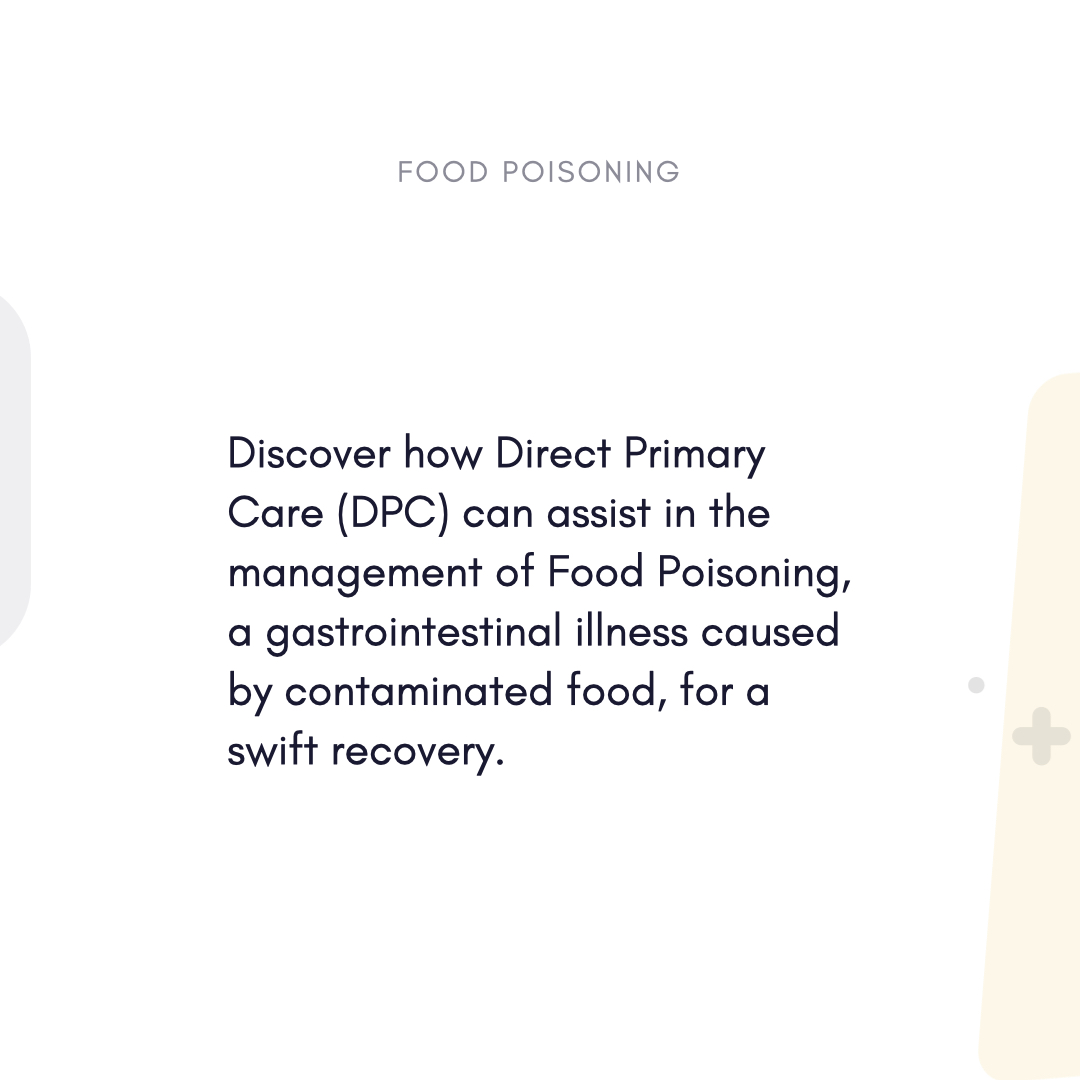Food Poisoning and Direct Primary Care (DPC): Rapid, Personalized Care for Recovery
Food poisoning brought on by contaminated food or water shows up as nausea, vomiting, diarrhea, and stomach cramps. Though most usually self-limiting, severe cases can cause organ damage, dehydration, or hospitalization. Direct Primary Care (DPC) offers a patient-centered approach to handle food poisoning by combining fast diagnostics, tailored treatments, and preventive strategies to guarantee recovery and minimize complications.

DPC Enhances Food Safety Control
- Quick Evaluation and Diagnostics
- Scheduling Same-Day or Next-Day Appointments: ER delays are avoided by quick assessments for acute illnesses including fever, nausea, or diarrhea.
- Find pathogens including Salmonella, E. coli, or Norovirus using in-house or lab testing.
- In severe cases, look for kidney failure or electrolyte abnormalities pointing to dehydration.
- Designed Treat Plans
- Oral Rehydration Solutions (ORS): Consist of reasonably priced electrolyte packets or premixed solutions.
- Administered in-clinic for severe dehydration: IV fluids help avoid hospitalization.
- Relief from Illness:
- For non-bloody diarrhea, loperamide and other antidiarrheals rule.
- Like ondansetron, antiemetics treat persistent nausea or vomiting.
- Reserved for bacterial infections—that is, Campylobacter, Shigella—per Infectious Diseases Society of America (IDSA) recommendations are antibiotics.
- High-Risk Fragile Group Patient Monitoring
- Close follow-ups for elderly, immunocompromised patients, pregnant women, help avoid complications including hemolytic uremic syndrome (HUS).
- Telehealth check-ins covering remote symptom monitoring and hydration levels.
DPC Benefits for Food Poisoning Patients
- Direct Provider Contact 24/7: For worsening symptoms including blood in the stool or confusion.
- Customized Plans Based on Pathogen Type, Risk Factors, Medical History:
- Transparency in Prices:
- Generic medications (such loperamide for USD 5 instead of USD 15+ retail).
- Not surprisingly for IV fluids, labs, or follow-up: No bill.
DPC Pathogen-Specific Care: Individualized Management of Food Poisoning
- Treat bacterial infections with antibiotics including azithromycin for Campylobacter or ciprofloxacin.
- In viral cases—Norovirus—pay close attention to hydration and symptom control.
- Antiparasitics treat parasitic infections; metronidazole for Giardia helps with this as well.
Diet and Rehabilitation Guideline
- The BRAT diet: Calls for toast to aid digestion, bananas, rice, applesauce.
- Steer clear of triggers: Including dairy, coffee, and spicy foods until you recover.
- Learning Preventives:
- Food Safety Behaves: Correct cooking and storage; hand washing.
- Travel Advice: In high-risk areas, avoid raw or untreated food.
Situations from Real Life: DPC in Action
- Case 1: A family avoiding ER trips after Salmonella poisoning received IV fluids and same-day stool tests.
- Case 2: An elderly patient severely dehydrated was under daily DPC telehealth monitoring until she recovered.
Why DPC Stands Out for Food Poisoning
- Speed: Use same-day treatment and tests to avoid ER delays.
- Using antibiotics according IDSA recommendations helps reduce resistance risks.
- Under one membership, test and treat entire families to stop household spread.
DPC Specifically Helps Those Affected by Food Poisoning
- Fast Same-day stool tests speed in identifying pathogens.
- Clearly priced IV fluids (USD 50 instead of USD 300+ ER cost) and medications.
- Preventive emphasis should be on post-recovery counseling on food safety and gut health, that is, probiotics.
Control Food Poisoning Using DPC
Food poisoning need not bring about a death sentence. DPC results:
- Fast, precise treatment to lower disease rates and stop complications.
- Reasonably priced, customized help for homes and individuals.
- Expert recommendations to reduce risks moving forward.






